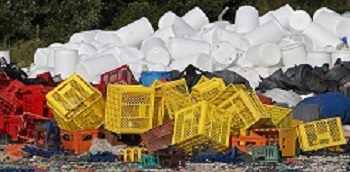Scrap rates for the injection moulding industry are easy to calculate, but often painful to believe – it is simply the difference in weight between how much plastic you buy in, and the total weight of parts delivered. Typically this is as much as 10%, although when questioned about scrap rates companies reported to us the figures they wanted to talk about – such as “customer reject rates” of 4.5ppm or their “production reject rate” where we heard of 0.001%. These figures are just self-congratulatory and distorted.
Scrap rates significantly affect the profitability of your business and many of the challenges to overcoming a high scrap rate have simple and logical solutions. Every £1 reduction in scrap production is worth more than £1 onto your bottom line.
Take a small moulder with sales of £5M, a net profit of 5% on sales yields £250,000. Up to half of the revenue could be on raw materials (£2,500,000) and with a scrap rate of 10% plus the cost of generating this scrap could result in a total cost of £350,000. If a 50% reduction in scrap could be realised, this not only reduces the cost of scrap by £175,000 it also increases the net profit by 70%.
There is no reason why it couldn’t be more, but to achieve anything requires a change in the way the business operates – put simply, it needs more knowledge. If your nearest competitor is buying materials, utilities and labour all at roughly the same rate, how do you become more competitive?
The reality is that if you don’t train your staff – you are willingly paying them to ruin your business.
The first reaction is normally along the lines of “…what if I train my staff and they leave?” but what you should really consider is “what will happen if you DON’T train them and they stay?”
If you are serious about improving the skills of your production workforce, ask yourself a few questions:-
– What training methods have you used in the past?
– Were any of these methods effective?
– What metrics were used to measure their effectiveness?
There are several methods used for training within the plastics industry, each of these methods has their pros and cons. With Routsis Training our unique approach uses a blended model where multiple training methods are combined to achieve maximum effectiveness. We have found that the 7 biggest mistakes that companies make with respect to training are:-
- Not using a training plan
- Not tracking results
- Relying on a single method
- Using materials that don’t apply
- Training only the key employees
- Presenting too much information too quickly
- Not using commercially available resources
Training needs to be structured and continuous in order to be effective, it should also be made available to all your employees as this will give you the largest pool of staff to choose from for advancement – we all know how difficult it is to recruit the right talent, don’t we ?
Most companies have experts in various departments, but very few have experts in training. All companies need some level of assistance in order to establish a complete in-house training system for developing the skills of their production workforce. We will visit your site and create a bespoke training plan for you and your employees and once the structured training plan is implemented the nominated facilitator often spends less than an hour a week delegating and no time doing the training themselves. Our system lets you and your employees focus on the core competencies while the structured training plan does all the work.
The backbone of the blended model from Routsis Training is interactive computer based training,these self-paced courses contain practical, up-to-date information and provide proven, trackable results. We also provide advanced process simulation software that helps employees develop the skills without wasting energy, material or risking damage to expensive production machinery.
OurRightStartTM training provides companies of any size to take advantage of the flexibility offered by having their own company-specific, dedicated online plastics training portal. Each Learning Management System (LMS) is branded with the company’s logo and can handle all aspects of a blended training initiative; from adding users and creating assignments – to administering offline training events and generating progress reports.The training will take approximately 9-12 months to undertake, incorporating on-line and on-the-job tasks to produce a fully upskilled workforce. More importantly it will be based at your site, using your machines, your moulds and your materials – so it is 100% relative to your business. We can train everyone from the store person and materials handlers to your process engineers and technicians. We have been doing it very successfully for many years.
The cost is about £600 per person but the return on this investment will be significantly greater.
Alternatively our SmartTechTM training offers the most effective hands-on training program for plastic processors and technicians. This unique combination of face-to-face, on-line, and hands-on skill development focuses on the science of injection moulding – not just on the workings of a particular injection moulding machine.
Two-thirds of the time is spent at the machine – making it a better way to help your company improve efficiency, profitability and its competitive position.
We can also offer many other on-line training courses and packages to suit your individual needs.
Would you agree that it could be worth giving us some of your time to show you how we could deliver a reduced scrap rate for your business?
Email sales@plastic-it.co.uk for more information or call 01952 815705 to find out how we can upskill your workforce, provide a reduced scrap rate and more importantly increase your profit.
If you still believe that you already have the best talent employed, take our free GAP Analysis test here (http://www.traininteractive.com/knowledge/return/analysis/)
Richard Webster – Plastic IT on behalf of PlastikCity

